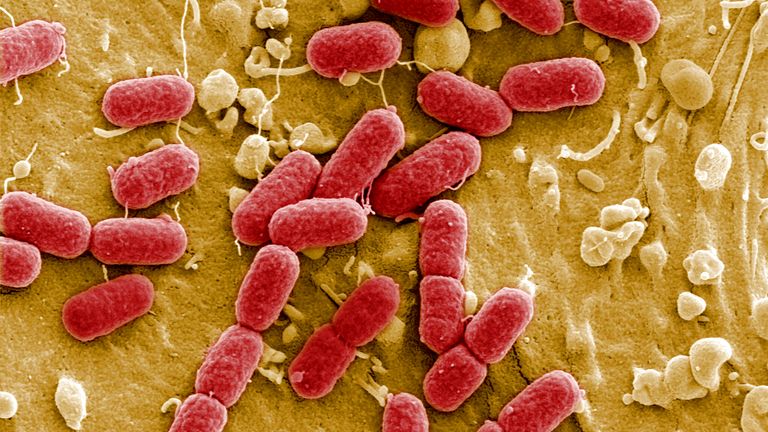Attempts to create synthetic 'mirror' bacteria must be stopped as it could kill off humans, scientists warn
Experts said the organisms, which are at least a decade away from being developed, could cause deadly infections to easily spread, resulting in "unprecedented and irreversible harm" to life on Earth.
Friday 13 December 2024 21:33, UK
A leading group of scientists has said research aimed at developing synthetic bacteria should be halted because it could pose an existential threat to humanity.
The coalition of 38 scientists across nine countries warned that the creation of so-called mirror bacteria – a form of life built with biological molecules in shapes that are the opposite of those found in nature – could end up being "catastrophic".
The experts said that some researchers "driven by curiosity" had started looking into developing the organisms, which they said were probably at least a decade away from becoming a reality.
However, they said they should stop because of the "unprecedented and largely overlooked risks".
The findings, published in the journal Science, said: "Our analysis suggests that mirror bacteria would likely evade many immune mechanisms... potentially causing lethal infection in humans, animals, and plants....
"We cannot rule out a scenario in which a mirror bacterium acts as an invasive species across many ecosystems, causing pervasive lethal infections in a substantial fraction of plant and animal species, including humans.
"Even a mirror bacterium with a narrower host range and the ability to invade only a limited set of ecosystems could still cause unprecedented and irreversible harm."
The group of scientists includes Professor Patrick Cai, an expert in synthetic genomics and biosecurity at The University of Manchester.
He said: "While mirror bacteria are still a theoretical concept and something that we likely won't see for a few decades, we have an opportunity here to consider and pre-empt risks before they arise.
"These bacteria could potentially evade immune defences, resist natural predators, and disrupt ecosystems. By raising awareness now, we hope to guide research in a way that prioritises safety for people, animals, and the environment."
Be the first to get Breaking News
Install the Sky News app for free


Read more from Sky News:
Bird flu 'could be spreading to horses'
NASA delays flagship moon landing plans
Writing in the journal, the scientists admitted that while they were "initially sceptical that mirror bacteria could pose major risks, we have become deeply concerned."
They said such organisms would "constitute a radical departure from known life" and added: "We call for additional scrutiny of our findings and further research to improve understanding of these risks.
"However, in the absence of compelling evidence for reassurance, our view is that mirror bacteria and other mirror organisms should not be created."
Jack Szostak, a co-author of the study and a 2019 Nobel Prize-winning chemist at the University of Chicago, said: "If robust mirror bacteria were created and released into the wild (or escaped from containment), the result could be catastrophic irreversible damage."
He added it could be "far worse than any challenge we've previously encountered - and far beyond our capacity to mitigate."




